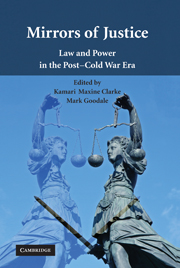Book contents
- Frontmatter
- Contents
- Editor Biographies
- Contributors
- Acknowledgments
- Introduction: Understanding the Multiplicity of Justice
- 1 Beyond Compliance: Toward an Anthropological Understanding of International Justice
- PART I JUSTICE AND THE GEOGRAPHIES OF INTERNATIONAL LAW
- PART II JUSTICE, POWER, AND NARRATIVES OF EVERYDAY LIFE
- 7 The Victim Deserving of Global Justice: Power, Caution, and Recovering Individuals
- 8 Recognition, Reciprocity, and Justice: Melanesian Reflections on the Rights of Relationships
- 9 Irreconcilable Differences? Shari'ah, Human Rights, and Family Code Reform in Contemporary Morocco
- 10 The Production of “Forgiveness”: God, Justice, and State Failure in Post-War Sierra Leone
- PART III JUSTICE, MEMORY, AND THE POLITICS OF HISTORY
- Epilogue: The Words We Use: Justice, Human Rights, and the Sense of Injustice
- Index
- References
9 - Irreconcilable Differences? Shari'ah, Human Rights, and Family Code Reform in Contemporary Morocco
Published online by Cambridge University Press: 25 January 2010
- Frontmatter
- Contents
- Editor Biographies
- Contributors
- Acknowledgments
- Introduction: Understanding the Multiplicity of Justice
- 1 Beyond Compliance: Toward an Anthropological Understanding of International Justice
- PART I JUSTICE AND THE GEOGRAPHIES OF INTERNATIONAL LAW
- PART II JUSTICE, POWER, AND NARRATIVES OF EVERYDAY LIFE
- 7 The Victim Deserving of Global Justice: Power, Caution, and Recovering Individuals
- 8 Recognition, Reciprocity, and Justice: Melanesian Reflections on the Rights of Relationships
- 9 Irreconcilable Differences? Shari'ah, Human Rights, and Family Code Reform in Contemporary Morocco
- 10 The Production of “Forgiveness”: God, Justice, and State Failure in Post-War Sierra Leone
- PART III JUSTICE, MEMORY, AND THE POLITICS OF HISTORY
- Epilogue: The Words We Use: Justice, Human Rights, and the Sense of Injustice
- Index
- References
Summary
In a highly critical article, Naz K. Modirzadeh (2006) challenges the international human rights community's refusal to address Shari'ah, or Islamic law, when it appears to foster violations of international human rights norms. According to her, this strategy is characterized by a caveat fidelis in almost all Human Rights Watch and Amnesty International reports focusing on Muslim societies, stating that international human rights NGOs (INGOs) take no position on religious law in the region and, for the most part, avoid the fact that many human rights violations in the region are rooted in some form or interpretation of Shari'ah. For most Muslims, she argues, “The question of ‘Islam and human rights’ is not, in fact, whether or not there is a conflict but, rather, how such a conflict is to be addressed”; the fact that INGOs refuse to address this conflict between two competing legal regimes is “bad for activists, bad for Islamic law, and bad for human rights” (2–3).
In an equally persuasive manner, Anthony Chase (2006) argues for the necessity of pursuing human rights in Muslim-majority Arab states outside of the framework of Islam: “[P]laying on Islamic turf is not only a transparent, losing strategy,…but, more dangerously, it also de-legitimizes non-Islamic norms in predominantly Muslim societies and implicitly accepts their marginalization” (Chase, 2006: 22). For him, human rights violations grow out of political, economic, and social phenomena rather than out of Islam; therefore, addressing and preventing violations must involve political, economic, and social solutions rather than reference to religion.
- Type
- Chapter
- Information
- Mirrors of JusticeLaw and Power in the Post-Cold War Era, pp. 191 - 207Publisher: Cambridge University PressPrint publication year: 2009



